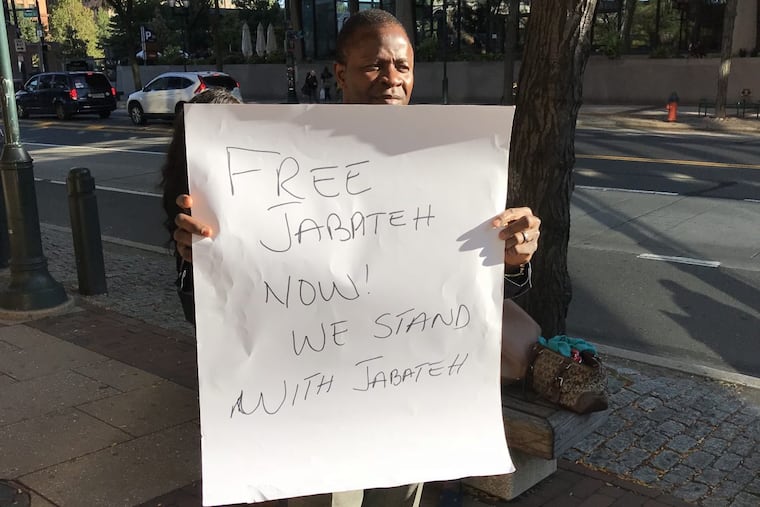'Jungle Jabbah' lawyer lashes out at accusers, feds, as case goes to jury
A war of words concluded the unusual trial that has played out in a federal courtroom in Philadelphia over eight days - as closely followed here in the West African hair salons and groceries that line Woodland Avenue as it is an ocean away in Liberia's capital of Monrovia.

The case against a Delaware County man accused of hiding his alleged past as a Liberian warlord was built on "tall tales," scant evidence, and lies, his lawyer said Tuesday in his final pitch to the federal jury that will decide his client's fate.
Mohammed Jabateh's accusers, defense lawyer Gregory Pagano said, were so desperate for anyone to blame for atrocities committed during the civil war that roiled their West African nation two decades ago that they framed an innocent man.
"These are tall tales of enemies settling old scores – not because they had personal experiences with him but because of what group he's identified with," Pagano said. "There is no greater motive than revenge."
But prosecutors — who say Jabateh committed acts of unspeakable violence and cruelty on civilians under the nom de guerre "Jungle Jabbah," only to escape to the United States unpunished — shot back.
"Revenge is sweet," said Assistant U.S. Attorney Linwood C. Wright. "But maybe justice is sweeter."
That war of words concluded the unusual trial that has played out in a federal courtroom in Philadelphia over eight days – as closely followed here in the West African hair salons and groceries that line Woodland Avenue as it is an ocean away in Liberia's capital of Monrovia.
The jury of eight women and four men spent less than an hour deliberating Tuesday as demonstrators, bearing signs with hand-scrawled messages such as "Free Jabbah! He's a victim," gathered outside the federal courthouse in Philadelphia in anticipation of a verdict. Jurors are expected to continue deliberating Wednesday.
Jabateh – a 51-year-old East Lansdowne father who owns an international shipping business – is accused of lying about his wartime experience in interviews with U.S. immigration agents and on forms he filled out while applying for political asylum in the United States in the late 1990s.
But his trial, which included wrenching testimony from 17 Liberian war-crime victims implicating Jabateh in unfathomable crimes ranging from mass murder and rape to cannibalism and enslavement, has taken on totemic status for those who survived the civil war.
More than 250,000 people died during the bloody, multi-factioned conflict, and reports of atrocities committed by all sides are well-documented. Yet Jabateh is only the second person tried anywhere in the world for wartime conduct in Liberia.
That broader sense of unpaid debts hung over the trial's closing arguments Tuesday.
"This is not about … some political war that's still going on in Liberia – some war whose wounds are still bleeding," Pagano said.
For his own part, Jabateh has never denied his involvement as a commander within the rebel group United Liberation Movement of Liberia (ULIMO) or that he used the nickname "Jungle Jabbah" during the war. He has consistently maintained that he did not commit any of the wartime acts of which he is accused.
He says he spent much of the war working security at Liberia's executive mansion for the country's equivalent of the U.S. Secret Service and that he, too, suffered torture and persecution doled out by the war's eventual victor, the regime of Liberia's future president Charles Taylor.
Pagano urged jurors to consider the role of international justice groups in locating most of the government's witnesses, and to question how many of those who testified against Jabateh may have been motivated by the still-lingering ethnic animosities that drove the conflict.
But prosecutors scoffed at those arguments, reminding the panel about the men and women from whom they heard directly throughout the trial: The woman who said she'd been turned into a 13-year-old sex slave and raped for weeks before she managed to escape. The backcountry farmer allegedly drawn into slavery in rebel controlled diamond mines. The village chieftain's wife allegedly forced to listen to her husband's death cries, only to be ordered later to cook up the man's heart for Jabateh's soldiers to eat.
Wright, the prosecutor, quoted Emma Lazarus, whose ode to America as a safe harbor for immigrants is inscribed on the Statue of Liberty.
"What that [statue] doesn't say is: Give me your war criminals, your human rights violators, your persecutors yearning for safe haven from their heinous acts," he said. "The reality is, there are just some people that are just not supposed to be in this great nation of ours."